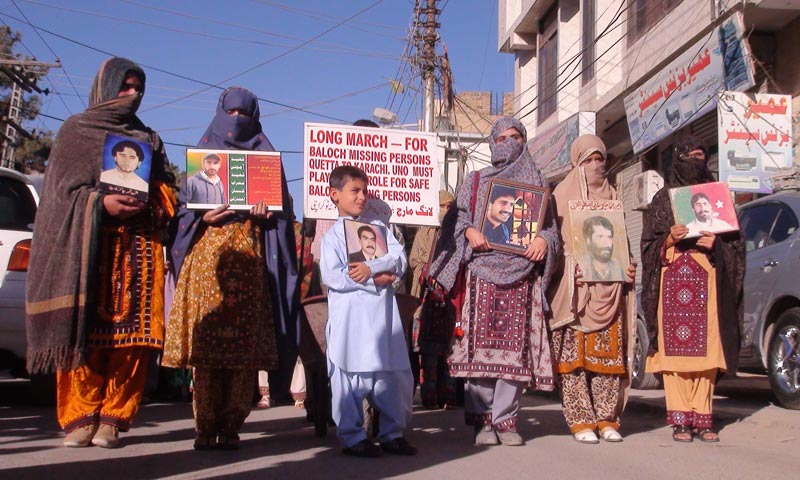"Rights Groups Say Pakistan Govt Involved in Killings of 1000 Baloch Activists"

NEW DELHI: The Pakistani government has been accused of having a hand in extrajudicial killings in Balochistan, as the bodies of close to 1000 political activists and suspected armed separatists have been unearthed in the restive province in the past six years.
The figures, reported by BBC Urdu and obtained in turn from the human rights ministry, point to large scale extra judicial killings, activists say. Relatives and associates of those killed say that the victims had been picked up by security agencies, and then went missing, with the dead bodies turning up after.
The government, however, blames the bodies on infighting between the various insurgent groups active in the troubled province.
The BBC reports that according to the Federal Ministry of Human Rights, at least 936 dead bodies have been found in Balochistan since 2011. Most of them were dumped in the regions of Quetta, Qalat, Khuzdar and Makran - areas where the separatist insurgency has its roots. The Pakistani government launched a military led operation in Balochistan in 2005, aimed at wiping out the ethnic Baloch uprising.
Pakistan’s response to the uprising compounded the problems, as a power vacuum has emerged in Balochistan, creating a potentially explosive environment in this southeastern province that borders volatile areas in Afghanistan.
The repressive measures adopted by the Pakistani government have weakened the social structures capable of containing radicalism. This is evinced by the fact that most Baloch nationalist parties began by articulating their discontent not in the demand for independence but within the legal framework of the constitution to demand more autonomy and rights. Over the years, in large part because of the repressive tactics adopted by the State, the Baloch nationalist movement has gotten more radicalised. The irony lies in the fact that the measures adopted by the Pakistani state are reinforcing the threat of ethnic nationalism whilst seeking to eliminate these separatist elements.
In addition to nationalist groups such as the Baloch Liberation Army (BLA), the Baloch National Movement, the National Party, the Balochistan National Party, and the Baloch Student Organisation, there has been an increase in sectarian groups in a province traditionally known for its secularism. Afghan and Pakistani Taliban (Tehrik-e-Taliban Balochistan), al-Qaeda, Lashkar-e-Janghvi, Sipah-e-Sahaba Pakistan, Imamia Student Organization, and Sipah-e-Muhammad have reportedly established their presence in the province.
Analysts ascertain that the Sipah-e-Sahaba and Lashkar-e-Janghvi possibly enjoy official protection, as they continue to hold major rallies publicly in the face of a ban. There has been an expansion of operational spaces for violent sectarian groups to function within, in Pakistan nationally, and in Balochistan specifically, as the government’s capacity and perhaps even willingness to investigate, prosecute and convict those involved in violent attacks is compromised.
This lacking government capacity was the focus of a report by the Human Rights Commission of Pakistan (HRCP), which stated that the provincial government is “nowhere to be seen.” In fact, the government’s repressive tactics in Balochistan may be the single most contributing factor to increasing militarisation and sectarianism in the province. The “kill and dump” operations, which were designed to reinforce the power of the state, have led to widespread anger and discontent targeted at the government for abductions and killings. The exact numbers are difficult to tally, but Baloch nationalists assert that there have been “thousands” of such cases.
The International Voice for Baloch Missing Persons says 18,000 people from the region are unaccounted for, of which approximately 2000 were killed between 2001 and 2013. There are vast discrepancies in the official numbers. In 2008, Interior Minister Rehman Malik placed the figure at 1100. However, in 2011, Balochistan Home Minister Zafrullah Zehri claimed that only 55 people were missing.
While there is contention on the numbers, there is an emerging consensus, amongst organizations including the Human Rights Watch and the HRCP, that most of these disappearances have been perpetuated by government institutions, specifically the intelligence agencies and Frontier Corps, often in conjunction with the local police.
It is important to note that the repressive measures are furthering sectarianism in a region where a resolution through dialogue and within the constitutional framework is politcally feasible. According to a survey conducted in July 2012, only 37 percent of the Baloch people favour independence, a figure even lower among Balochistan’s Pashtuns. However, 67 percent of the population wants greater autonomy. This indicates the possibility for compromise through political negotiation. The government of Pakistan has to stop treating Balochistan as a law-and-order problem; its insistence on doing so by responding to the crisis through repressive measures will only lead to an increase in the numbers favouring independence and a rise in violence in the region.



